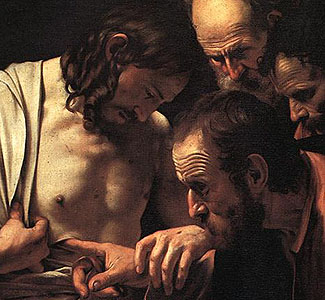12 April 2015
Homily of the Apostolic Nuncio
His Grace Archbishop Petar Rajič
Acts 4:32-35; 1 Jn 5:1-6; Jn 20:19-31
Our faith in the resurrection invites us to encounter the living Lord in our common worship and private prayer. Upon experiencing the grace of the Lord’s presence, we naturally respond by accepting the truth of his resurrection and Christ’s offer of peace. In today’s gospel, Jesus greets his disciples three times with the words: Peace be with you! Though the apostles all abandoned him on the night of the Last Supper, Peter denied knowing him three times and Judas even betrayed him, the Lord did not come back to them to seek vengeance, but he gave them his pardon and peace.
Peace is a fruit of the Lord’s mercy and forgiveness freely given to us on Calvary so that our sins would be wiped away forever. For this reason we also celebrate today Divine Mercy Sunday. His peace is the reassurance that though our sins may be numerous and we have not always been faithful to God, the Lord in his great mercy, forgives us our sins and constantly offers us his peace.
As pardoned sinners we can now unite our sufferings to those of Christ. They then have a deeper meaning, for they lead us to a greater love that cannot be cancelled or forgotten, just like the wounds of Christ that remain in his glorified body as a sign of God’s irreversible love towards us. His peace is also the knowledge that our wounds and weaknesses are no longer limitations, but opportunities for growth.
Jesus then goes on to say: As the Father has sent me, so I send you. We have received the same commission Jesus gave to the first disciples, which is to go out and tell the good news with our words and through the example of our lives, that Jesus Christ is Lord, so that all may believe!
Though we are to go out and become his witnesses, we cannot do this on our own strength and will always require help from heaven. For this reason Jesus said: Receive the holy Spirit. Whose sins you forgive are forgiven them, and whose sins you retain are retained. The Holy Spirit empowers us and guides us, if we remain united to Christ. As Jesus forgave us our sins, now we in turn are to forgive one another always. By these same words, the Lord gave his apostles the authority to absolve sins in the Sacrament of Reconciliation. This sacrament has been given to us by the Lord for our healing and eternal salvation so that we can experience God’s divine mercy at work through the mission of the Church.
Upon meeting Thomas the doubting apostle, Jesus says to him directly: Put your finger here and see my hands, and bring your hand and put it into my side, and do not be unbelieving, but believe. It is interesting to note here that Jesus understood Thomas’ doubt and that he approached him in order to help heal his disbelief. When we have our own doubts and are full of unresolved questions, the Lord helps heal those areas where we lack faith by calming our souls and minds with his presence, which gives us peace.
After seeing the Lord, Thomas replies with a simple and beautiful expression of faith: My Lord and my God! These words, spoken by a mortal man to the living and eternal God, are exactly what we should be saying to Jesus each time we encounter him at Mass and see his Body and Blood raised up upon the altar.
Have you come to believe because you have seen me? Blessed are those who have not seen and have believed. These are the final words of Jesus to the apostle. In other words, the Lord is saying ‘blessed are you who cannot see me with your own eyes, but see me with the eyes of faith, who believe in me, who live according to my word and who recognize me present in your brothers and sisters’. The Lord is alive and amongst us. He is present where there is belief, in spirit and in truth, shown in sincere love. We discover his presence through faith, which is his free gift to us. It is not imposed, but offered for our taking. It is a fruit of our trusting and believing in him. Though we have not seen or touched Jesus personally, we can “touch” him when we confess faith in him as our Lord and our God. This personal encounter through faith leads to blessedness that changes our lives forever.


